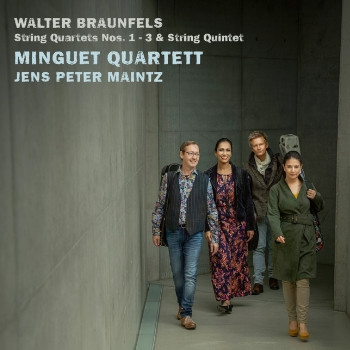Het Minguet Quartett brengt met hun nieuwe album een eerbetoon aan de Keulse componist Walter Braunfels.
English version below
De componist Walter Braunfels (1882-1954) was een gevierd pianist en componist die in 1925 het Tweede Pruisische Conservatorium oprichtte, waar hij professor was tot 1933. Hij werd ontslagen vanwege zijn (half) Joodse afkomst en trok zich terug in Zuid Duitsland, aan de Bodensee. Afgezien van deze afzondering, was vanaf 1938 het concert-verbod met muziek van Joodse componisten desastreus voor de componist. Als dan in 1939 ook nog de IIde Wereld Oorlog uitbreekt en Braunfels zijn jongste zoon verliest, heeft dat weerslag op zijn werken. Zo ook op zijn Strijkkwartet Nr. 1 dat hij in 1944 componeerde. Een werk waar woede, pijn, hartstocht en weemoed samenkomen in een geslepen compositie. Al deze muzikale uitingen komen razendsnel voorbij en vergen veel van de uitvoerende musici, omdat ze snel en virtuoos moeten verbinden in samenspel en unanieme benadering. Het Minguet Quartett bijt zich vast in dit werk en haalt eruit wat erin zit. Met een doortastend gemak klinkt er een soepele uitvoering waarin met verve en veerkracht wordt gespeeld.
Walter Braunfels had zijn tijd niet mee. Enerzijds componeerde hij in de laat-romantische stijl die in zijn tijd door Hitler (vanwege zijn Joodse afkomst) werd verboden, en anderzijds werden na de IIde W.O. zijn composities als ouderwets gekenschetst en raakte zijn werk snel in de vergetelheid. Maar ja, als we zo gaan beginnen is de muziek van Mozart ook ouderwets en die van Monteverdi helemaal. Als composities kwaliteit hebben, dan hebben ze dat jaren later nog steeds. Dat geldt ook voor de drie strijkkwartetten en het strijkkwintet van Braunfels. Zijn werken zitten vol polyfone passages met fraaie, dissonante en dwingende harmonieën, complementaire ritmiek en unisono en solistische passages (zoals we die later ook aantreffen in de strijkkwartetten van Mieczysław Weinberg). Al deze compositie-technieken drukken sferen uit die elkaar vliegensvlug afwisselen. Naast het Strijkkwartet Nr. 1, nog een paar highlights: het 2de deel van Strijkkwartet Nö 2 heeft een dwingende ritmiek en thematiek, die een warme link heeft met de Holberg Suite van Grieg. Het IVde deel (Rondo) van het Strijkkwintet in F flat minor (het Minguet Quartett aangevuld met cellist Jens Peter Maintz) heeft een heerlijk vrolijk en nationaal karakter met opgewekt wisselende thematiek. Het Minguet Quartett is een ensemble van wereldklasse. Met dit nieuwe album geeft het kwartet de muziek Braunfels de glans die het verdient. Door de veerkrachtige uitvoeringen bewijzen deze vier musici dat de werken van Braunfels de tijdloosheid krijgen die het verdienen. Het Minguet Quartet uit Keulen draagt (zoals gezegd) dit prachtige album op aan de componist Walter Braunfels, die in Keulen nog steeds volop wordt gewaardeerd. Nu in de rest van de wereld nog!
English version
With their new album, the Minguet Quartett pays tribute to the composer Walter Braunfels from Cologne.
The composer Walter Braunfels (1882-1954) was a celebrated pianist and composer who founded the Second Prussian Conservatory in 1925 and was a professor until 1933. He was fired because of his (half) Jewish descent and withdrew to southern Germany, to Lake Constance. Apart from this seclusion, from 1938 the ban on concerts with music by Jewish composers was disastrous for the composer. When the Second World War broke out in 1939 and Braunfels youngest son died at the front, the repercussions on his work was evident. Likewise in his String Quartet No. 1, which he composed in 1944. A work where anger, pain, passion and melancholy come together in a crafty composition. All these musical expressions pass by very fast and demand a lot from the performing musicians, because they have to connect quickly and virtuoso in interplay and unanimous performance. The Minguet Quartett really gets a grip on this composition and with resolute ease they play a smooth performance with verve and resilience.
Walter Braunfels‘ music had a kind of double feeling in his time. On the one hand, he composed in a late romantic style that was banned by Hitler in his time, because of his Jewish heritage, and on the other, after World War II his compositions were characterized as old-fashioned and his work quickly fell into oblivion. But yes, if we start like this, then Mozart’s music is also old-fashioned and Monteverdi’s for sure. If compositions have quality, they still have it for years. This also applies to the three string quartets and the string quintet composed by Braunfels. His works are full of polyphonic passages with beautiful, dissonant and compelling harmonies, complementary rhythms, unison and solo passages (as we later find in Mieczysław Weinberg’s string quartets). All these composition techniques express an atmosphere and alternate with each other in a flash. Besides the String Quartet No. 1, another few highlights: the 2nd movement of String Quartet Nö 2 has a compelling rhythm with a theme that has a warm link with Grieg’s Holberg Suite. The fourth movement (Rondo) of the String Quintet in F flat minor (the Minguet Quartett supplemented here by cellist Jens Peter Maintz) has a wonderfully cheerful and national character with lovely varying themes. The Minguet Quartett is really a world-class ensemble. With this new album the quartet gives Braunfels‘ music the shine that it deserves. Through the resilient performances, they make these compositions timeless. The Minguet Quartett from Cologne dedicates this beautiful album to the composer Walter Braunfels, who is still highly appreciated in Cologne. So, up to the rest of the world!
*Minguet Quartett: String Quartets – Walter Braunfels (AVI-music.de)
© Mattie Poels.


Geen reacties